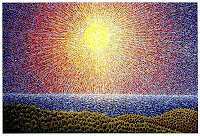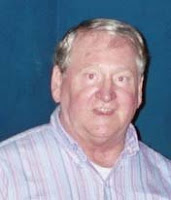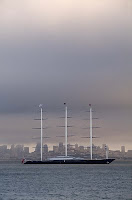
a journalistic report
by Peter Menkin
About the Desert Cross and its controversial court debate:
A white steel pipe cross that stands off a lone highway route by about 10 miles in the California Mojave Desert has become the subject of a legal case. The legal case regarding the cross will be heard before the U.S. Supreme Court in October, 2009. This is a unique case of Church/State separation in the United States.
The Christian cross has in one form or another been in this location since 1934, and was originally a war memorial to American First World War veterans. (The lonely road is between Los Angeles and Las Vegas.) The cross is now claimed by veteran’s organizations and by the individual who privately erected it. It is located on the public parkland, erected without permission.
The American Civil Liberties Union (ACLU) represents the Plaintiff—who is a “practicing Catholic” by his own definition, and a retired Assistant Superintendent of the desert park district. The Plaintiff’s argument goes, according to the ACLU: "The [9th Circuit] said this case is really quite simple. Using a sectarian religious symbol is not permissible on federal land.” Peter Eliasberg, managing attorney for the ACLU of Southern California, so states the argument in a report by B.A. Robinson of the Ontario Consultants on Religious Tolerance. The government argues the cross is a war memorial.
Attorney Eliasberg states, "…[The Christian cross] doesn't honor Muslim veterans, Jewish veterans, Atheist veterans or Agnostic veterans. It's a preeminent symbol of a [single] religion. If we want to have a war memorial on federal land, the government certainly knows how to do that without using a divisive sectarian religious symbol."
In a telephone interview lasting half an hour from his office in Arizona, the attorney Joe Infranco retorts, “One person’s agenda (Mr. Buono’s, Plaintiff) should not diminish the sacrifices (of) Americans and their families. The legal theory used in these cases is offended observer.” Mr. Infranco argues, “It bothers people that one person’s offence causes the destruction of a memorial that millions of veterans want to see maintained.” Mr. Infranco, who has talked about this issue for a long time, says in a verbal headline during the interview: “Two American veteran’s organizations, the American Legion, and the Veterans of Foreign Wars (among others) weighed in against by lone atheist: Frank Buono.”
Mr. Buono, says he is a “practicing Catholic,” and has not talked to his parish priest or bishop about the subject. Mr. Buono continues in explanation, and adds in argument: “If open and available to all religious symbols, and all religious beliefs, [the memorial would be okay], but the park service originally rejected a request to put a Buddhist symbol there. To me this (Christian cross) was an (act of) endorsement of a specific religious view of tolerating and accepting a trespass on federal land.”
Explaining his 10-year cause, Plaintiff Mr. Buono remarks about the use of a cross or religious symbol, in this specific case the white cross of iron pipe: Is this a war memorial by intent? he was asked in the interview: “When a private person erects a religious symbol on federal land, no matter what they call it…in the case of the cross it (is) improper. That it is a war memorial is not relevant to the case.”
Continuing by phone, Mr. Buono reports with emphatic emphasis, the federal park service asked Henry Sandoz to remove the cross, (another in a long serious of replacements of the originally erected one by numers of private persons). It was Mary Martin, Superintendent of Mojave National Preserve who asked. Henry Sandoz refused. “Mr. Sandoz erected the cross that is now there with no permit or authority for the purpose to serve religious purposes for sunrise (services). Henry Sandoz did not remove it.”
U.S. Congressman Jerry Lewis, Redlands, California sponsored a vote by the U.S. Congress to allow a private purchase of the park property on which the cross stands. Mr. Buono says, this was, “his error.” After the private purchase, the American Ninth Circuit Court of Appeals denied the Congressional measure, and the cross remains standing, but covered.

Mr. Buono claims this erection of the cross is an, “illegal act by a private individual which led to the erection of permanent display of a religious symbol on public lands.” “What is my concern? It doesn’t make me happy (because) I know that what guarantees freedom of religion in America is strict separation of Church/State. Strife occurs elsewhere in the world is in places where religion is not separated from State. The best guarantee by government neutrality towards religion.”
Congressman Jerry Lewis (not the actor/comedian) did not respond to an inquiry by email on his measure to save the cross from removal.
Mr. Infranco, the attorney for the Alliance Defense Fund, who is defending the cross, will make the oral arguments before the U.S. Supreme Court. He says he is not aware of any organized American Church position on the issue at this time.
Correction to article by Mr. Joe Giles, Alliance Defense Fund (May 7, 2009) sent via email. He writes:
Important clarification we might want to make – our role was only in filing the amicus (or “friend of the court”) brief with the Supreme Court. The Solicitor General office of the U.S. Department of Justice will be the Counsel of Record for the Department of the Interior (thus, Joe Infranco wouldn’t be arguing before the S. Ct.).
This report was written for the website, Religious Intelligence, London.










